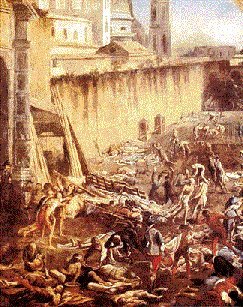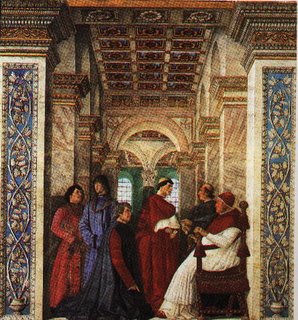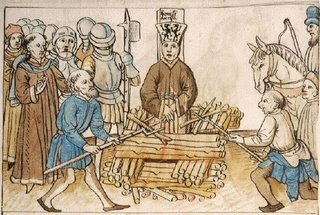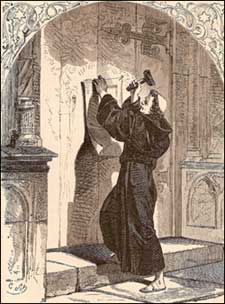The Sovereignty of God over the Flea on a Vagabond Rat
Job 42:1-2(NASB)
1Then Job answered the LORD and said, 2"I know that You can do all things, and that no purpose of Yours can be thwarted.
Proverbs 21:1 (NASB)
1The king's heart is like channels of water in the hand of the LORD; He turns it wherever He wishes.
Proverbs 16:1-4 (NASB)
1The plans of the heart belong to man, but the answer of the tongue is from the LORD. 2All the ways of a man are clean in his own sight, but the LORD weighs the motives. 3Commit your works to the LORD and your plans will be established. 4The LORD has made everything for its own purpose, even the wicked for the day of evil.
Romans 13:1 (NASB)
1Every person is to be in subjection to the governing authorities for there is no authority except from God, and those which exist are established by God.
As I was sitting in my drab, windowless Humanities class last week, I was suddenly stirred by the absolute sovereignty of God in all situations and in all areas of life...even in things that may appear as minimal modalities of His plan...even in something as small as the flea on a vagabond rat.

Picture this:
The setting is Genoa, Italia--1300s. This was a period signifcant for its rising economy based on Venetian
 and Genoese shipping and long-distance trade. Not only did foreign goods arrive from the trading
and Genoese shipping and long-distance trade. Not only did foreign goods arrive from the trading  ships to these two growing regions, but a carrier of one of the most deadly diseases ever to touch the people of Europe...the fleas infected with Pasteurella Pestis, also known as the Bubonic Plague.
ships to these two growing regions, but a carrier of one of the most deadly diseases ever to touch the people of Europe...the fleas infected with Pasteurella Pestis, also known as the Bubonic Plague.These tiny carriers of such an outstandingly devastating disease rode their way into Eur
 ope on the backs of vagabond rats. The seemingly harmless rodents scurried their way off the newly arrived ships, only to infect an already unstable land, dominated by feudalism.
ope on the backs of vagabond rats. The seemingly harmless rodents scurried their way off the newly arrived ships, only to infect an already unstable land, dominated by feudalism.Maybe you know the rest of the story, maybe you don't. But, oh! It really is quite fascinating! You see, this deadly plague soon infected the inhabitants of not only Italy, but similar to a rippling wave caused by a stone thrown into a pool of water, so this disease did ripple itself into the European landscape, wiping out one-third of the population.
The effects of such horrific plague brought about not only a multitude of deaths, but when seen in light of other circumstances tugging at the heart of Europe at the time, such as the Hundred Years' War (1337-1453), and the growing disatisfaction with the Roman Catholic Church, one can begin to understand the social and political upheaval that began. The rise of wages for the future middle class, the rise of nationalism, and yes, possibly most important of the three, the eventual rise of literacy began to spring forth, creating a whole new dynamic to Europe's social, political, and religious scene. And so the story continues...(in a bit of a nutshell, possibly cracked, hoping some of you will bind the crevices where I have fallen short).

A new middle class began to sprout as a result of the demand for higher wages after the Bubonic Plague. Because the Plague wiped out so many, the peasants could indeed demand these higher wages--their work was needed. What to do with a peasant class that is ever growing financially? If you are the nobility, tax the heck out of them. In fact, peasant revolts were quite common responses to such acts of taxation. One such example, the Jacquerie in France, revolted as a result of being taxed to help fund the Hundred Years' War. However, to the benefit of this working class, the great losses caused by the Bubonic Plague and the Hundred Years' War encouraged them to try to profit by selling their services for higher prices. They wanted to improve their social standings by attempting to climb up the unstable economic ladder of the time.
 Image this. People are dropping like flies from not only a terrible plague, but also, as a result of a vicious war. The clergy offered very little solace to the growing discontentment of the people. One such massive event, The Great Schism (1309-1376), weakened the reputation of the Roman Catholic Church more than any previous event. At this time, the Church elected three different Popes, all ruling with Papal authority from three different areas--Rome, France, and Pisa. Excommunication of one another was their only tool, thus you can image how the common man felt in regards to "Church authority"...they viewed such previous institutions of "authority" as anything but competent. Along with ever transparent corrutption, this inability to handle authority greatly weakened the Roman Catholic Church's reputation among the common people.
Image this. People are dropping like flies from not only a terrible plague, but also, as a result of a vicious war. The clergy offered very little solace to the growing discontentment of the people. One such massive event, The Great Schism (1309-1376), weakened the reputation of the Roman Catholic Church more than any previous event. At this time, the Church elected three different Popes, all ruling with Papal authority from three different areas--Rome, France, and Pisa. Excommunication of one another was their only tool, thus you can image how the common man felt in regards to "Church authority"...they viewed such previous institutions of "authority" as anything but competent. Along with ever transparent corrutption, this inability to handle authority greatly weakened the Roman Catholic Church's reputation among the common people.
By the grace of God, men of true faith, such as John Wyclif, and Jan Hus arose to the scene. Wyclif (1330-1384) wrote that papal claims of temporal power had no foundation in the Scriptures and that the SCRIPTURES ALONE SHOULD BE THE STANDARD OF CHRISTIAN BELIEF and PRACTICE. He urged that such practices (veneration of saints, pilgrimages, pluralism, and absenteesim) as exhibited by the Roman Catholic Church, must be abolished, and that sincere Christians should READ THE BIBLE for THEMSELVES. Wyclif thus created, by the grace of God, the first English translation of the Bible. Such advances as adminstered by Wyclif brought about the desctruction of the medieval structure of the Church, in opposition to lay literacy of the Bibl
 e. In God's perfect planning, such a man is now hailed as the precursor to the 16th Century Reformation, because of his flamboiant challenges to the corrupt, oppressive structures of the Roman Catholic Church. Jan Hus (1369-1415) likewise, stood for the ideas exhibited by Wyclif. Hus was later burned at the stake for accepting such reformatory ideas, along with many of those who followed, called Lollards (followers of Wyclif).
e. In God's perfect planning, such a man is now hailed as the precursor to the 16th Century Reformation, because of his flamboiant challenges to the corrupt, oppressive structures of the Roman Catholic Church. Jan Hus (1369-1415) likewise, stood for the ideas exhibited by Wyclif. Hus was later burned at the stake for accepting such reformatory ideas, along with many of those who followed, called Lollards (followers of Wyclif).Though this later rise in literacy (as an outpouring of discontentment of the common people from disease (Bubonic Plague), war (Hundred Years' War), and corrupt Church structures (Great Schism)) flowered to it's fullest during the time o
 f the Renaissance and the Reformation (15-16th centuries), growing acceptance of humanism and desire to return to the "Golden Age of Greece" pushed many into the production and spread of unBiblical ideas
f the Renaissance and the Reformation (15-16th centuries), growing acceptance of humanism and desire to return to the "Golden Age of Greece" pushed many into the production and spread of unBiblical ideas  found in such works as Thomas More's Utopia, Petrarch's reproductions of the works of Cicero, Alberti's On the Family, and Pico's Oration on the Dignity of Man. However, this gradual rise in literacy ultimately allowed, by the grace of God, for one of the most important events in all of Western Christendom...God's usage of Martin Luther in bringing about absolute Reformation of the Church.
found in such works as Thomas More's Utopia, Petrarch's reproductions of the works of Cicero, Alberti's On the Family, and Pico's Oration on the Dignity of Man. However, this gradual rise in literacy ultimately allowed, by the grace of God, for one of the most important events in all of Western Christendom...God's usage of Martin Luther in bringing about absolute Reformation of the Church.Though the story goes back deep and wide, and continues forward in the same manner, here is just a little slice of the delicacy of one of the most outstanding, tramatic, and life changing periods of European history. And to think...such upheaval begin with God's sovereignty over the flea on a vagabond rat.

0 Comments:
Post a Comment
<< Home